- Home
- Nancy Mitford
The Pursuit of Love
The Pursuit of Love Read online
PENGUIN BOOKS
The Pursuit of Love
Nancy Mitford (1904–73) was born in London, the eldest child of the second Baron Redesdale. Her childhood in a large, remote country house with her five sisters and one brother is recounted in the early chapters of The Pursuit of Love (1945), which, according to the author, is largely autobiographical. Apart from being taught to ride and speak French, Nancy Mitford always claimed she never received a proper education. She started writing before her marriage in 1932 in order ‘to relieve the boredom of the intervals between the recreations established by the social conventions of her world’ and had written four novels, including Wigs on the Green (1935), before the success of The Pursuit of Love in 1945. After the war she moved to Paris where she lived for the rest of her life. She followed The Pursuit of Love with Love in a Cold Climate (1949), The Blessing (1951) and Don’t Tell Alfred (1960). She also wrote four works of biography: Madame de Pompadour, first published to great acclaim in 1954, Voltaire in Love, The Sun King and Frederick the Great. As well as being a novelist and a biographer she also translated Madame de Lafayette’s classic novel La Princesse de Clèves into English, and edited Noblesse Oblige, a collection of essays concerned with the behaviour of the English aristocracy and the idea of ‘U’ and ‘non-U’. Nancy Mitford was awarded the CBE in 1972.
Zoë Heller is the author of three novels: Everything You Know; Notes on a Scandal, which was nominated for the Man Booker Prize in 2003; and The Believers.
The Pursuit of Love
NANCY MITFORD
Introduction by Zoë Heller
PENGUIN BOOKS
To Gaston Palewski
PENGUIN BOOKS
Published by the Penguin Group
Penguin Books Ltd, 80 Strand, London WC2R 0RL, England
Penguin Group (USA) Inc., 375 Hudson Street, New York, New York 10014, USA
Penguin Group (Canada), 90 Eglinton Avenue East, Suite 700, Toronto, Ontario, Canada M4P 2Y3
(a division of Pearson Penguin Canada Inc.)
Penguin Ireland, 25 St Stephen’s Green, Dublin 2, Ireland (a division of Penguin Books Ltd)
Penguin Group (Australia), 250 Camberwell Road, Camberwell, Victoria 3124, Australia
(a division of Pearson Australia Group Pty Ltd)
Penguin Books India Pvt Ltd, 11 Community Centre, Panchsheel Park, New Delhi – 110 017, India
Penguin Group (NZ), 67 Apollo Drive, Rosedale, North Shore 0632, New Zealand
(a division of Pearson New Zealand Ltd)
Penguin Books (South Africa) (Pty) Ltd, 24 Sturdee Avenue, Rosebank, Johannesburg 2196, South Africa
Penguin Books Ltd, Registered Offices: 80 Strand, London WC2R 0RL, England
www.penguin.com
First published 1945
Published in Penguin Books 1949
Reissued with a new introduction in this edition 2010
Copyright © the Estate of Nancy Mitford, 1945
Introduction copyright © Zoë Heller, 2010
All rights reserved
The moral right of the author of the introduction has been asserted
Except in the United States of America, this book is sold subject to the condition that it shall not, by way of trade or otherwise, be lent, re-sold, hired out, or otherwise circulated without the publisher’s prior consent in any form of binding or cover other than that in which it is published and without a similar condition including this condition being imposed on the subsequent purchaser
ISBN: 978-0-14-196473-7
Contents
Introduction
Chapter 1
Chapter 2
Chapter 3
Chapter 4
Chapter 5
Chapter 6
Chapter 7
Chapter 8
Chapter 9
Chapter 10
Chapter 11
Chapter 12
Chapter 13
Chapter 14
Chapter 15
Chapter 16
Chapter 17
Chapter 18
Chapter 19
Chapter 20
Chapter 21
Introduction
Some novelists emerge, as if from the head of Zeus, with their talents fully formed, their distinctive styles already in place. Others shilly-shally for a couple of books until, for reasons that have as much to do with chance as with effort, they happen upon an idea, or a character, or even an opening sentence, that liberates whatever is most interesting in their writing selves. Mitford had produced four works of fiction by the time The Pursuit of Love was published in 1945, but it was only in this novel – her first attempt to capture the sui generis oddities of Mitford family life – that her genius finally declared itself.
The Pursuit of Love may be reasonably described as a comic novel – a light comic novel even – but it is too spiky and intelligent, I think, to qualify as an altogether cosy or comforting novel. I have revisited it many times over the last thirty years and if I have been drawn back in most instances by a slightly lazy desire for familiar, reliable pleasures, the actual experience of reading the book has never failed to surprise that complacent expectation. The jokes are peerless, yes. I doubt I shall ever tire of reading Linda’s horrified account of housekeeping or Uncle Matthew’s outraged review of Romeo and Juliet or Davey’s devastating analysis of the Radlett family’s ‘museum-quality’ mineral collection. But beneath the brittle surface of this novel’s wit there is something infinitely more melancholy at work – something that is apt to snag you and pull you into its dark undertow when you are least expecting it. In contrast to some of the more obviously serious novels that impressed me in my youth, whose depths have since proved disappointingly plumbable, this unassuming bit of mid-century ‘chick lit’ has not only held up beautifully over time, but continues to yield riches.
Years of pressing the book enthusiastically on friends and loved ones have taught me some caution, however. Mitford’s fiction is strong meat. Readers who appreciate it at all, tend to love it with a dotty passion; others, who escape the enchantment, are apt to despise it with almost equal fervour. The decisive factor, in either case, would seem to be the voice – the unmistakable, arresting Mitford trill, in whose light, bright cadences, an entire hard-to-shock and easy-to-bore view of life is made manifest. This voice is not actually a voice, of course; it is the illusion of a voice, painstakingly created in prose. The narrator of this novel, Fanny, writes with such immediacy and casual fluency – her tone is so natural and true – that it is easy to forget this fact. ‘The charm of your writing,’ Evelyn Waugh once wrote to Mitford, ‘depends on your refusal to recognize a distinction between girlish chatter and literary language.’ Indeed, if Mitford has never quite received her due as a stylist – if even her devotees are inclined to classify her as a ‘guilty pleasure’ – it is perhaps because the sound of light, extemporaneous chatter in her prose is too convincing.
Such attention as her style has received over the years, has tended to emphasize its documentary value. It has been praised as a peculiarly vivid example of how the jeunesse dorée spoke in 1930s England, or, even more narrowly, as a charming demonstration of Mitford family idiolect. The achievement, in other words, has been understood to be one of transcription rather than of writing. But the felicities of Mitford’s style cannot, in fact, be reduced to class or period, or even to Hon-ish locutions. There is care – there is art – in the most artless-seeming passages of this novel. Examine the insouciant sentences, the frothy dialogue, carefully, and you will find that they are as precise as algebraic equations: you cannot tinker with their syntax or vocabulary without irrevocably harming the result. Here is Linda, describing to Fanny, in typically breathless fashion, the man who will beco
me her second husband: ‘Well, he’s heaven. He’s a frightfully serious man, you know, a Communist, and so am I now, and we are surrounded by comrades all day, and they are terrific Hons, and there’s an anarchist. The comrades don’t like anarchists, isn’t it queer? I always thought they were the same thing, but Christian likes this one because he threw a bomb at the King of Spain; you must say it’s romantic. He’s called Ramón, and he sits about all day and broods over the miners at Oviedo, because his brother is one.’
This is an impeccable spoof on a young woman’s dizzy, para-tactic speech patterns but it is also a rather deft dramatization of the speaker’s complicated attitude towards her new social circle. Linda is in love with Christian – eager to love what he loves – but at the same time, she detects something absurd in the deadly seriousness of the comrades and in her unlikely involvement with them. The tonal distinction between her genuine reverence (‘He’s a frightfully serious man… they are terrific Hons’) and her sly amusement (‘. . . but Christian likes this one because he threw a bomb at the King of Spain’) is a subtle one – not least because Mitford’s characters have a tendency to sound most wide-eyed when they are at their most satirical. (In her novel The Blessing, Mitford sums up the typical English joke as, ‘naive but penetrating’. Even so, by the time we get to the account of the lugubrious Ramón, and the inspired silliness of the final clause, ‘because his brother is one’, there can be no doubt that Linda has succumbed to the temptation of a classic Mitfordian ‘tease’.
Linda’s amused response to Communist earnestness is not untypical of this novel’s attitude towards any number of grave causes and important historic movements. Various political philosophies are adumbrated in the course of the plot, but, with the possible exception of Linda’s dreamy defences of England’s ancien régime, none of them are taken remotely seriously. The seminal lesson of Linda’s two failed marriages – the first to a Tory with Nazi sympathies, the second to Christian – would seem to be that equal degrees of absurdity and dullness exist at either end of the ideological spectrum. The only point at which Linda can be said to lose her intense charm is when she tries, briefly, to take politics seriously. (Much to Fanny’s relief, the experiment is doomed by Linda’s constitutional inability to feel ‘wider love for the poor, the sad and the unattractive’.)
For some, Mitford’s brazen indifference to big ideas, coupled with her minute attention to the sex and love lives of the privileged upper class, condemn this, and all her other novels, to inconsequentiality. Fanny’s husband, Alfred, speaks for generations of Mitford’s detractors when he rebukes his wife in Love in a Cold Climate, for the triviality of her preoccupations: ‘[G]eneral subjects do not amuse you, only personalities.’
Of course, Alfred and his fellow critics tend to take a rather narrow view of what constitutes the ‘general’. There is, after all, a long and honourable history of women writers who have used small canvases and gossipy plots in the service of expansive moral themes. (Jane Austen, lest we forget, devoted the entirety of her estimable oeuvre to posh people’s love lives and never once got round to mentioning the French Revolution or the slave trade.)
I am not sure, however, that we serve Mitford well by attempting to shoehorn her into this tradition. She is too devoted to making fun of everything, too allergic to any admission of moral seriousness. If she is flippant about political causes, she is not, in any obvious way, earnest about her characters either. She tends to keep her protagonists at a coolly amused distance – focusing on their public performances of themselves and declining to ferret about in their private emotional states. Even the heroine of this novel remains largely opaque to us – a ‘flat’ character in Forsterian terms, as opposed to a ‘round’ one. Fanny offers breezy, rather banal speculations on how ghastly it must be to be married to Tony, or how blissful it must be to have an affair with a Frenchman, but we see for ourselves almost nothing of Linda’s interior life – despite the many occasions on which her feckless behaviour cries out to be mitigated by some insight into her conscience.
Any number of modern novelists might take on the daring task of depicting a heroine who rejects her newborn, but the chances are that they would psychologize the act – would ask the reader to enter into the horror and shame of not wanting one’s child and so on. Mitford does none of that. She asks us, instead, to laugh at Linda’s jokes about the hideousness of little Moira and to accept that in the long run, the child will be much better off with her stepmother, the ghastly, blue-haired Pixie Fairweather. (Children in Mitford’s fiction are remarkably hardy, cynical little creatures.)
The writer, Andrew O’Hagan is among those who find something ultimately repugnant in such show-off cruelty. He identifies Mitford’s style as an exemplar of the ‘posh aesthetic’ – a beguilingly witty school of English prose at whose centre lies a moral void. ‘The posh aesthetic appeals to people who want life’s profundities to scatter on the wind like handfuls of confetti. The great enemy of the posh aesthetic is effortfulness, which is why aristocrats find the middle classes so absurd. All that labour, all that seriousness: so much more stylish to laugh at death, etc… For the devoted toff, effort and compassion are embarrassing in life and horrific on the printed page.’
There is no use disputing that Mitford’s levity, her undisguised preference for amusing sinners over virtuous dullards, her highly stylized complacency in regard to social injustice and class inequities, are all potent provocations. And it may be that an era like ours – an era that sets such store by the uncomplicated generosity and ‘big-heartedness’ of its popular writers – is particularly ill-suited to appreciating her astringent pleasures. Even so, O’Hagan’s account of Mitford’s style does not seem to me entirely accurate. If Mitford’s heart does not lie moistly on her sleeve, it is a mistake to conclude that it is nowhere about her person. And if her humour often flirts with facetiousness, it does not, in the end, I think, represent a dismissal of ‘life’s profundities’, so much as a rigorously unsentimental way of coping with those profundities. It would be a very obtuse reader who failed to notice the murmur of pain in this novel, the hints of desolation lurking within its merriment.
The novel begins, in fact, in explicitly elegiac mode, with the contemplation of an old Radlett family photograph. ‘There they are, held like flies, in the amber of that moment – click goes the camera and on goes life; the minutes, the days, the years, the decades, taking them further and further from that happiness and promise of youth.’ Fanny moves the narrative along quickly, thrusting us into the gay doings of the young Radlett girls, but the muted note of anguish that is struck here – the minatory intimation of life’s pain and disappointment and brevity – continues to sound throughout the novel. We hear it, not in spite of the jokes, or as some sort of pious addendum to the jokes, but resonating from their very centre. Think of Davey and Linda and Fanny in the linen cupboard at Alconleigh, wittily forecasting the way in which their inter-war generation will be traduced in future decades. Somewhere in the course of this breezy exchange, the perspective telescopes and we find ourselves glimpsing the skeletons beneath the skins of these gorgeously alive people.
A reader might wish that Mitford wrote passionately and expansively about the miseries of war, and the outrage of death, and the sadness of being in a bad marriage. But it is simply wrong to read her teasing prose as a denial of those experiences. Nor is it quite accurate to say that Mitford is embarrassed by earnestness and effort: she is embarrassed by the advertisement of these things, certainly, but the hard work that it takes to keep up a ‘good shop-front’ is something she admires very much. Linda’s lover, Fabrice, who speaks so eloquently in defence of ‘les gens du monde’, does in fact have principles for which he is prepared to risk his life: he simply wouldn’t dream of boring a lady with those principles at luncheon. Linda herself has plenty of private sorrows: it would just never occur to her to whine about them publicly.
It is the elegance of this discretion – the courage of it – tha
t ultimately redeems Mitford’s heroine. More than her beauty or bouquet-like charm, what we are asked to admire in Linda is the bravery with which she pursues her rackety course. Unlike Fanny, who has found in her marriage to Alfred ‘a refuge from the storms and puzzles of life’, Linda has dared to stay out on the romantic heath. And if she is buffeted by the high winds of fleeting passions – if she falls in love with asses and often makes an ass of herself in the process – she has the good sense and the guts to never apologize, never explain. ‘Don’t pity me,’ she tells Fanny when she returns from France, still married to Christian and pregnant with another man’s child. ‘I’ve had eleven months of perfect and unalloyed happiness, very few people can say that, in the course of long long lives, I imagine.’
Whether it is better to hold out, like Linda, enduring loneliness and infamy in return for the occasional feast of transcendent pleasure, or to settle like Fanny for a steady but uninspiring diet of marital contentment, is one of the great questions of the novel. Fanny envies the glamour of Linda’s adventures, but she has too much sense not to be appalled by the radical uncertainty of a life lived according to sensibility. The possibility that her friend will end up with ‘nothing to show’ for her troubles, frightens her. And when she asserts, at the end of the novel, that Linda has found true love with Fabrice, this seems to be her way of reassuring herself that Linda’s existence has, after all, had meaning, that her pursuit of love has not been in vain. Fanny’s mother, the Bolter (who knows quite a lot about the ways of men like Fabrice) is doubtful. But if her sceptical words – the final words of the novel – seem to point to an utterly comfortless conclusion, Linda herself has shown us one further possibility: that a life lived with passion and brio may have beauty and value, even if one ends up with ‘nothing to show for it’ and that the search for true love is a noble endeavour, whether or not it concludes in domestic bliss.

 The Blessing
The Blessing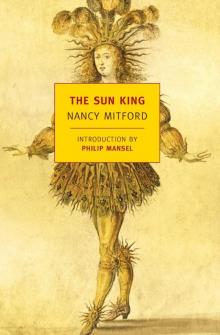 The Sun King
The Sun King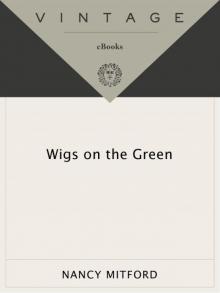 Wigs on the Green
Wigs on the Green Love in a Cold Climate
Love in a Cold Climate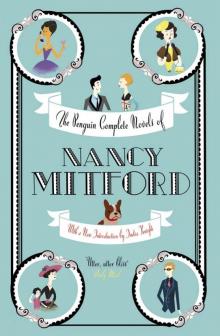 The Penguin Complete Novels of Nancy Mitford
The Penguin Complete Novels of Nancy Mitford The Pursuit of Love
The Pursuit of Love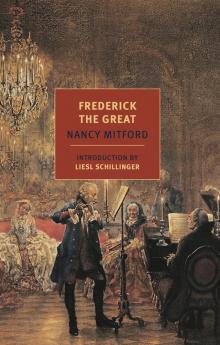 Frederick the Great
Frederick the Great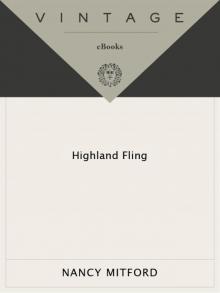 Highland Fling
Highland Fling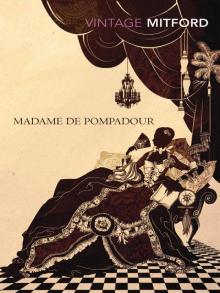 Madame de Pompadour
Madame de Pompadour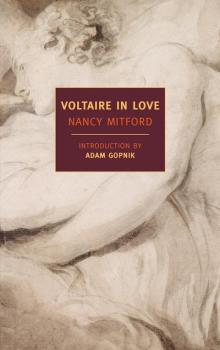 Voltaire in Love
Voltaire in Love Don't Tell Alfred
Don't Tell Alfred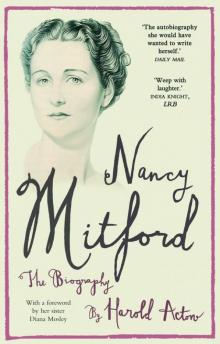 Nancy Mitford
Nancy Mitford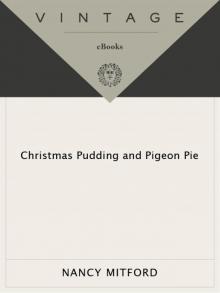 Christmas Pudding and Pigeon Pie
Christmas Pudding and Pigeon Pie